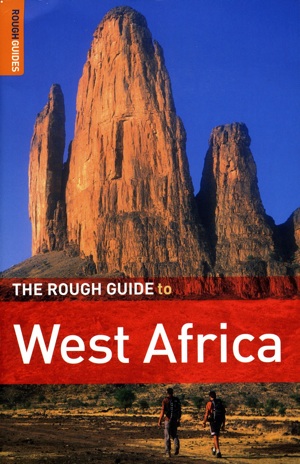Interview with Jeremy Weate: Off the Map in Nigeria
Travel Interviews: Frank Bures talks to the guidebook author about the challenges and rewards of travel in Nigeria
04.21.10 | 11:56 AM ET
 Jeremy Weate
Jeremy WeateWhen I got to Abuja, Nigeria, I called a friend of a friend who’d invited me to crash at his place. His name was Jeremy Weate, and when I arrived, he saw my Rough Guide and asked how I liked it. I gushed: The Nigeria section, at 148 pages, with five pages about Nigerian literature, another five on music, and a wonderful section on food, was easily one of the best guidebook sections I’d ever read.
MORE: The Roads Between Us: A Journey Across Africa
“Well that’s good to hear,” he said, “because I wrote it.”
After we got back to his place, I sat down with Weate and asked him what it’s like to write a guidebook about a place so unpredictable, difficult and thrilling.
What’s the hardest part about writing a guidebook about a place like Nigeria?
The hardest part is to get the right balance between making people realize that is a tough place to visit, with lots of challenges on the one hand. And on the other hand you’re actually writing a guidebook, so you have to be relatively upbeat. You don’t want to over-romanticize the place, but you don’t want to be too negative. I thought the previous version of the Nigeria section was a little too negative, so I tried to make it a bit more upbeat.
Nigeria’s a place where, if you’re an outsider, it’s definitely adventure tourism. It’s similar in many ways to going to Colombia or Brazil. You have to be guarded and be aware of all the risks, and have a local you can trust to help you out. I would say it’s very similar to going to Brazil: a fantastically varied, interesting place with unknown cultures and aspects of human existence which have not been studied yet, really, in any detail. Completely off the map.
But you do need a guide, you do need to be careful. I led an expedition with the Nigerian Field Society to climb the tallest mountain in Nigeria. We were 10 days off road. We had two satellite phones, three guys who knew the area very well. We had a whole bunch of porters to carry stuff. We had cooks. It was like a proper colonial expedition. We had satellite maps of the whole area, and we knew the route we were going to take. You can’t just set out and do that without thinking things through, because things can go wrong. But if you do some advance planning and have some local knowledge, you’ll have experiences that are very different from a holiday in Spain or going to South Africa or something.

In retrospect are you glad you wrote the Nigeria chapter?
Yeah. And I hope in its own tiny little way it’s helping get some good information out on Nigeria.
Even though it’s got a terrible reputation, and even though Lagos is probably one of the worst cities in the world, the kind of cultural abundance and hidden stories of Nigeria are, for a certain type of person, absolutely fascinating.
Yeah, I went to visit the Eredo outside of Lagos. And it was actually fairly easy to get to.
Exactly. That place is a kingdom whose history has not really been recorded. Basically it was the rampart for the ancient town of Ijebu—the Ijebu kingdom, which was sort of a pre-Yoruba city, and one of the elements that fed into Yoruba identity. But it hasn’t been studied or archeologized apart from this random British cyclist who comes upon it. And that’s not the only example. There are so many, like in Calabar there are the Ikom monoliths, which are sort of the Stonehenge of Nigeria. Not as big, but like three- or four-foot-high stones, sort of rounded in shape, and they’ve got writing on them. Nobody knows what the script is.
There’s an American woman who claims that it’s Hebraic script or has some link with it. And there’s a certain thinking amongst the Igbo that they have a relationship to the Jews. There is some thinking that they’re the children of Shem, or the idea that before the deforestation of the Sahara certain Hebraic groups went south to the Sahara. So amongst the Igbos is a strong feeling that they are related to the Jews. You’ll even meet some Igbos who were brought up in a Jewish context—they think of themselves as Jewish.
That’s fascinating.
It’s a fascinating place, Nigeria. It’s one of the most complex places to live. And you’ll never really get it. It’s so complex that no one human brain can really assimilate all the different aspects in one grand narrative. There is no grand narrative to Nigeria—there’s no one story you can tell. It’s sort of a hodgepodge of many different stories and cultures.
Yeah, there’s so much great stuff.
Yes, it’s a shame because if the government was smarter, it would take the culture and package it in an appropriate way. And it never really tries to do it very well. It’s always a bit random. Take the Argungu Fishing Festival, where there’s never any place to stay. Or the Durbars in the north. They are amazing spectacles. They’re basically horse pageants to honor the Emirs. I took my parents a few years ago, and it blew their minds. It really is like a savanna version of a medieval Elizabethan pageant.
Nigeria has such massive untapped riches. Whether it will ever have the infrastructure is the question. But there’s a lot to see and engage with if you’re really up for it. You would never come here for a beach holiday, or a chill out holiday. But if you’re coming for hard core human experiences, what better place? ![]()
pelu awofeso 04.21.10 | 4:16 PM ET
He Jeremy. Great to meet you here and read your thoughts on Nigeria. You pretty much have the country well factored out. And to be candid, I never knew you had the remotest connection to guidebook/travel writing. Well done